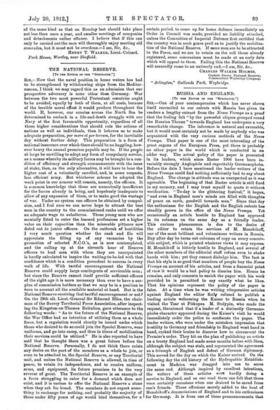THE NATIONAL RESERVE.
[To THE EDITOR OF THE " SFECT•TOE."]
SIR,—Now that the naval position in home waters has had to be strengthened by withdrawing ships from the Mediter- ranean, I think we may regard this as an admission that our prospective adversary is none other than Germany. War between the two most powerful Protestant countries ought to be avoided, equally by both of them, at all costs, because of the terrible moral effeot it would produce throughout the world. If, however, our cousins across the North Sea be determined to embark in a life-and-death struggle with our Navy at the first favourable opportunity, regardless of all those higher considerations that should rule the actions of nations as well as individuals, then it behoves us to make adequate preparation, per mare et per terrain, for the inevitable day without further delay. This preparation is a form of national insurance over which there should be no haggling, how- ever heavy the annual premium payable may be. If the people at large be unwilling to adopt any form of compulsory service, as a means whereby its military forces may be brought to a con- dition of efficiency and strength commensurate with the issue at stake, then, as the only alternative, it will have to bear the higher cost of a voluntarily enrolled, and, in some respects, less efficient army. But whichever scheme be adopted the weak point in our armour will remain, namely, the officers. It is common knowledge that these are numerically insufficient for the forces already in being, and hopelessly inadequate to allow of any expansion of them, or to make good the wastage of war. Under no system can officers be obtained by compul- sion, and I feel sure we can never hope to attraot the best men in the country to the commissioned ranks until we offer an adequate wage to subalterns. Those young men who are mentally fitted to enter the learned professions set a higher value on their capacities than the miserable pittance now doled out to junior officers. On the outbreak of hostilities I very much question whether the rank and file will appreciate the filling up of any vacancies by the promotion of selected N.C.O.'s, as is now contemplated, and the calling up at the eleventh hour of Reserve officers to lead men with whom they are unacquainted is hardly calculated to inspire the waiting-to-be-led with that confidence which is a condition precedent to success in every walk of life. With tactful encouragement the National Reserve could supply large contingents of serviceable men; but since the Reserve cannot itself provide sufficient officers of the right age it is more necessary than ever to have a sur- plus of commission holders so that we may be in a position to turn to account all the available material at hand. But is the National Reserve receiving that tactful encouragement or not? On the 29th ult. Lieut.-General Sir Edmond Elks, the chair- man of the Surrey Territorial Force Association, after inspect- ing the Kingston-on-Thames Battalion, gave utterance to the following words : "AS to the future of the National Reserve, the War Office had no intention of utilizing them as a whole force, but a. regulation would shortly be issued under which those who desired to do so could join the Special Reserve, wear uniforms, and go into camp, and thus in times of mobilization their services could be utilized." He is also reported to have said that he thought there was a great future before the National Reserve. Personally, I do not think there exists any desire on the part of the members as a whole to join, or even to be attached to, the Special Reserve, or any Territorial unit, and unless the National Reserve is allowed, in time of peace, to retain its independence, and to receive uniform, arms, and equipment, its future promises to be the very reverse of great. The Territorial Reserve is an example of a force struggling to cater for a demand which does not exist, and it is useless to offer the National Reserve a stone when they ask for bread. The members do not expect some- thing in exchange for nothing, and probably the majority of Those under fifty years of age would bind themselves, for a
certain period, to come up for home defence immediately an Order in Council was made, provided no liability attached, unless the Committee of Imperial Defence first certified that the country was in such grave peril as to justify the mobiliza- tion of the National Reserve. If more men are to be attracted to the Force, and we are to retain on the roll those already registered, some concessions must be made at an early date which will appeal to them. Failing this the National Reserve will assuredly come to an untimely end.—I am, Sir, &c.,
CHARLES WALKER HOLMES, Captain Surrey National Reserve; Commandant Weybridge Company.
"Arlington," Oatlands Park, Weybridge.






































 Previous page
Previous page